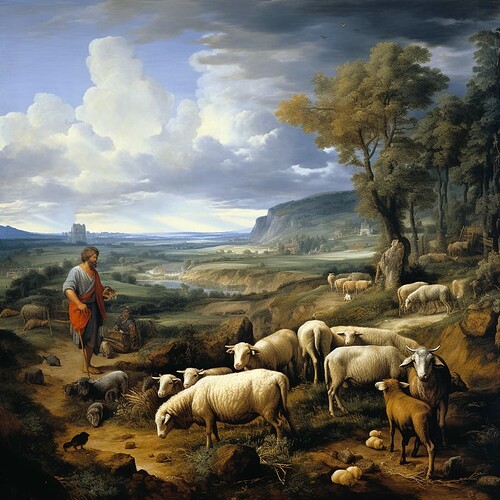Navigating Family Dynamics and Upholding Faith
 Introduction
Introduction
On January 14th, our journey through Genesis takes us to chapters 25 and 26, where we witness the continuation of Abraham’s legacy and the challenges faced by his son, Isaac. These chapters offer insights into family dynamics, the consequences of choices, and the steadfastness of God’s promises.
 Genesis 25: The Generations of Abraham
Genesis 25: The Generations of Abraham
Genesis 25 marks the end of Abraham’s journey and the beginning of the stories of his sons, Isaac and Ishmael. The chapter also introduces us to Esau and Jacob, Isaac’s sons, whose rivalry and choices set the stage for significant future events in the biblical narrative.
Key Verse: “Abraham left everything he owned to Isaac.” — Genesis 25:5
 Genesis 26: Isaac’s Challenges and God’s Faithfulness
Genesis 26: Isaac’s Challenges and God’s Faithfulness
In Genesis 26, we see Isaac navigating his own trials, including a famine, disputes over wells, and interactions with Abimelech. Despite these challenges, Isaac’s experiences mirror those of his father, emphasizing God’s ongoing faithfulness to His promises.
Key Verse: “Do not go down to Egypt; live in the land where I tell you to live.” — Genesis 26:2
 Key Themes and Reflections:
Key Themes and Reflections:
Continuation of the Covenant: These chapters underscore the continuation of God’s covenant with Abraham through Isaac, despite human imperfections and challenges.
Family Dynamics and Their Impact: The rivalry between Esau and Jacob highlights the complexities of family relationships and the long-lasting impact of parental decisions and favoritism.
God’s Unchanging Promises: Throughout Isaac’s journey, God reaffirms His promises made to Abraham, demonstrating His unchanging nature and faithfulness.
 Today’s Application:
Today’s Application:
Reflect on the ways family dynamics have shaped your life and faith journey. Consider how you respond to life’s challenges and the role of divine guidance in your decisions. Acknowledge the importance of God’s unchanging promises and faithfulness in your personal walk with Him.
 Hidden Gem:
Hidden Gem:
Did you know? The sale of Esau’s birthright to Jacob for a bowl of stew foreshadows the significant role that these brothers and their descendants will play in the unfolding story of Israel.
 Reflective Q&A:
Reflective Q&A:
![]() Genesis 25: Understanding Life’s Transitions
Genesis 25: Understanding Life’s Transitions
![]() How do the transitions and decisions in Genesis 25 reflect on our own life choices and their consequences?
How do the transitions and decisions in Genesis 25 reflect on our own life choices and their consequences?
A: The choices made by Abraham’s family, particularly Esau and Jacob, remind us that our decisions, especially in times of transition, have lasting effects and can shape our future and legacy.
![]() Genesis 26: Faith Amidst Challenges
Genesis 26: Faith Amidst Challenges
![]() What can we learn from Isaac’s experiences in Genesis 26 about trusting God during difficult times?
What can we learn from Isaac’s experiences in Genesis 26 about trusting God during difficult times?
A: Isaac’s experiences teach us about the importance of faith and reliance on God’s promises, even in the face of adversity, and the significance of seeking His direction in every aspect of life.
 Join the Discussion:
Join the Discussion:
How do these chapters from Genesis inspire you in your own family life and faith journey? Share your thoughts and reflections on the continuation of Abraham’s legacy in the comments below!
genesis25 genesis26 #AbrahamLegacy #FamilyDynamics #BibleStudy #SpiritualJourney #FaithChallenges
![]() See You Tomorrow in Genesis: Continue with us as we delve deeper into the rich and complex narratives of Genesis, exploring the foundations of faith and God’s enduring promises.
See You Tomorrow in Genesis: Continue with us as we delve deeper into the rich and complex narratives of Genesis, exploring the foundations of faith and God’s enduring promises.
 Join the forum!
Join the forum!
Engage with our AIgniteScripture Community for deeper exploration and discussion:
Free Members: Join vibrant discussions, access extensive biblical resources, and connect with a community of faith. Register here: 🌟 How to Join Page - Membership Options
Supporters Membership ($20/month or $200/year): Get exclusive access to in-depth studies, personalized newsletters, and a supportive faith community. Become a Supporter: 🌟 How to Join Page - Membership Options
![]() Stay Connected with our AIgniteScripture Newsletter: Follow our daily scripture journey for enhanced insights and understanding. Subscribe here: https://newsletter.aignitescripture.com/
Stay Connected with our AIgniteScripture Newsletter: Follow our daily scripture journey for enhanced insights and understanding. Subscribe here: https://newsletter.aignitescripture.com/

